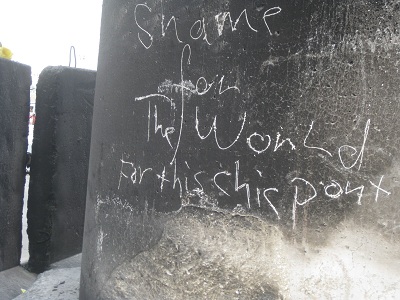
By Tamar Fleishman
“Ten minutes of standing in the line leading to the soldiers’ post and three more minutes of standing in the inspection zone, were enough to grasp how they implement the declared objective of ‘keeping the population in a state of constant uncertainty’” — The words of a high ranking Israeli officer.
People were taken inside the inspection zone in groups of three. Just before me in line was an elder man who placed the few metal objects he carried in his pockets on a plastic tray that was taken away by the conveyer belt inside the metal detector. He presented his ID and passage permit to the soldiers through the bullet proof window.
The soldiers, using the computer on their desk, thoroughly examined his identity; they asked over and over again that he presents the ID and ordered him to push the permit through the slot in the wall. The permit passed over to the other side, and as the soldiers took it into their hands it was confiscated. The man froze with a terrified look on his face. “Why?” I asked. “Because”, replied the soldier. “That’s not an answer”, I insisted. “It’s classified” replied the soldier. I insisted. He explained that these orders came from above.
The Palestinian man, whose gaze wondered off from the soldiers over to us, the two Israeli women he had never met and most probably would never meet again, sensed a tone of solidarity as though he expected that his salvation would come from us. And like a person who had his entire world collapse, asked: “What will I do now?”- “Hurry to the DCL, they still haven’t closed”, replied the soldiers.
Lost and confused he rushed to make his way through the crowd that massed on the turnstiles outside. His belongings that were earlier placed on the plastic tray: a phone, a key set and some coins, were forgotten.
We hurried after him and through the metal bars handed his possessions over to him.
There was also a woman who came all the way from Nablus. She arrived panting at the checkpoint and she told us that eleven years earlier soldiers had entered her home, shot and murdered her husband, leaving her to take care of ten orphans. Recently, one of her children fell ill and was admitted to Mukased hospital in East Jerusalem, and that is where she was heading to. She was the only one to receive a permit to visit her son from the authorities of occupation. His brothers, being the children of a man murdered by the army, are regarded as a threat to the state of Israel and were prevented from sitting aside their brother’s bed.
Living their shattered lives, the Palestinians are forced to arrive from between the fences and metal bars, all for the sake of their survival. We have only made a few steps alongside them, but it was enough to make us feel upon arriving at the other side as though we have been kicked in the stomach with nailed boots.
Or as an anonymous hand inscribed on the tower: “Shame for The World for this chicpont”(sic).
(Translated by Ruth Fleishman)
– As a member of Machsomwatch, once a week Tamar Fleishman heads out to document the checkpoints between Jerusalem and Ramallah. This documentation (reports, photos and videos) can be found on the organization’s site: www.machsomwatch.org. The majority of the Spotlights (an opinion page) that are published on the site had been written by her. She is also a member of the Coalition of Women for Peace and volunteer in Breaking the Silence. She contributed this article to PalestineChronicle.com.





SHAME FOR THE WORLD
Apartheid. Shame on the world to support Israeli aparheid but condemning South African apartheid, now conquered.
Cruel beyond belief. They’ll get theirs.